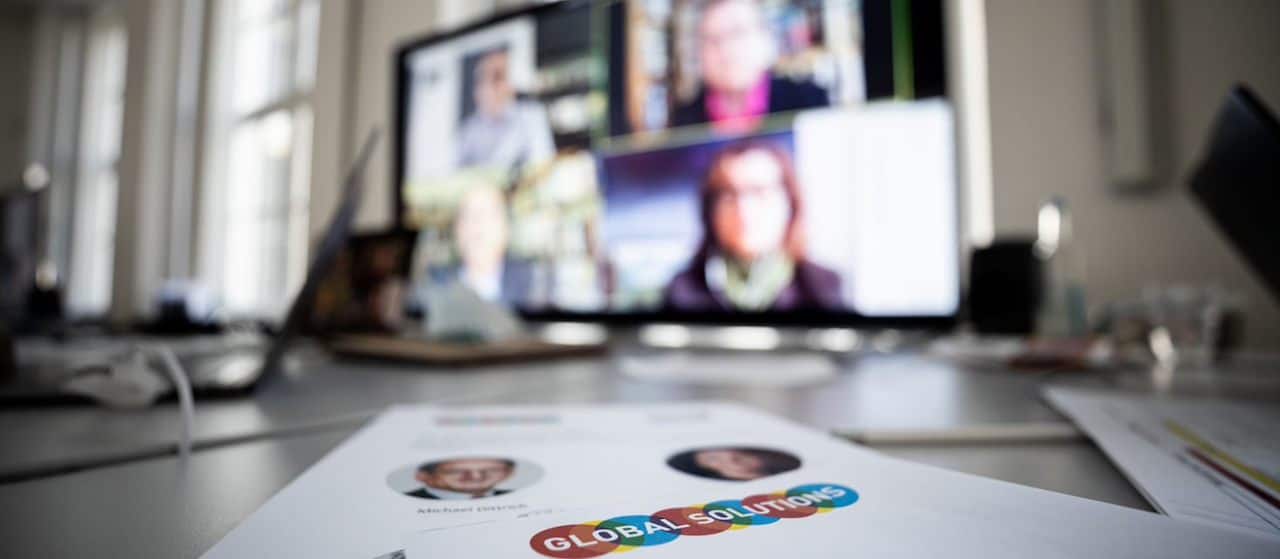
Like with many other areas of life and work, the Global Solutions Initiative Summit 2020 was unable to escape the impacts of COVID-19. Rather than cancel the Summit entirely, the organisers and sponsors worked to make it an entirely online event. Having attended the inaugural Summit in person as a 2017 Young Global Changer and participated in the 2020 Summit from afar from Sydney, Australia, I would like to reflect on some of the major differences and potential implications for future Summits. Here are five of my reflections.
1. A virtual Summit is better than no Summit
Having been sponsored to attend the 2020 Summit in Berlin in person it was disappointing not to be able to attend the Summit. However, I strongly believe having a digital Summit is better than having no Summit at all. Not only is it a credit to the organisers who switched to a new method of delivery at a very late stage and go digital, but it’s a show of determination. Despite dealing with a serious global pandemic, there are still many other socioeconomic development challenges that deserve global attention. They still require different ways of thinking and delivery and innovative programs and policies to help resolve or overcome them.
One of the positive outcomes of having a virtual Summit is a hugely reduced carbon footprint. In order to attend in person, hundreds of people from all over the world – would have had to travel to Berlin – with many having to fly. Indeed, the topic of environmental sustainability is a key component of the Global Solutions Recoupling Dashboard and was mentioned by many speakers and panellists during the Summit.
2. Blended Summits are likely to represent the future
Even if the 2021 Global Solutions Summit can be a full in-person event, the organisers could capitalise on the experience and learnings of the 2020 Summit. An increasing amount of content could be recorded or filmed to ensure there is evidence of what key programs, policies and changes have been promoted and that that momentum will continue to be built upon.
While organisers may be able to invite more and more people in person to future Summits, the major debates, messages, concerns and actions taken, can be spread faster and to many more people through virtual, online networks. Learning from the challenges and successes of the 2020 Summit will therefore be very important for future Summits. In the spirit of global collaboration, it will also be important for the Global Solutions Initiative to share these lessons with others who are interested.
3. Ongoing engagement and greater participation
As is often the case, people attending a conference or event, are excited by what they hear and learn, and are inspired to try and make sustainable changes for themselves, the organisations they represent or their governments, but quickly lose the momentum.
Establishing a strong virtual, online community of change makers may lead to opportunities to have more regular engagement. The fact, that online engagements can take place across many different borders and time zones, can allow for people who would not usually engage or connect with one another to now do so.
More regular engagement could also foster increased collaboration between Global Solutions Initiative stakeholders and alumni – such as between Young Global Changers. Even if the Summit organisers may not even be aware of these collaborations, they should be keen to promote them.
The Summit organisers may also seek to engage invited participants – and other experts and stakeholders more broadly – to contribute to future Pre- and Post-Summit debates, to set challenges that require engagement and collaboration, and to help promote the key themes of the Global Solutions Initiative to a broader audience.
4. Growing voice of the Young Global Changers
Welcome to the 90 new Young Global Changers who were selected to participate in the 2020 Summit and now join the alumni network! There are now over 350 Young Global Changers representing more than 110 countries from all continents and regions of the world. While we often hear expressions like ‘the youth represent the future’ there are many summit and policy making forums where the youth either have no say or a limited say. The Global Solutions Initiative should be commended for recognising the importance of engaging the youth and for getting the resources to invite them to the 2020 and past Summits.
It was great to read about the Young Global Changer Ambassadors and their views on the COVID-19 pandemic and what we can do to overcome it in a recent YGC blog. As they say “We are young activists, organizers, innovators, entrepreneurs, intrapreneurs, researchers, academics, students and more. There are many ways in which we can do our part in this crisis.”
This year, for the first time, the Young Global Changers engaged digitally with the themes of the Global Solutions Summit. They met virtually in working groups, discussed and produced statements and video questions on some of the most relevant issues of the Summit. You can watch their contributions on the Summit’s website.
5. Sustainable changes are occurring and are more widely possible
Despite the COVID-19 pandemic, and many other global challenges, a strong sense of hope and optimism that ‘sustainable change is possible’ came through to me from engaging with the 2020 Summit. While there is a recognition that it will not be easy, known and unknown challenges are likely to arise, and that there will be no ‘one size fits all’ solutions, we as stakeholders, can learn from what has already been attempted (successful or unsuccessful) and use this as a starting point from which to move forward.
In my own engagements with other Young Global Changers, and research of them for other YGC blog articles, I have been amazed at the great diversity of views, array of achievements and strong willingness to work collaboratively to overcome complex, wicked problems. Like the Global Solutions Initiative itself, many of them, too recognise that “a global paradigm shift is urgently needed” and are actively prepared to work towards achieving this.
An article by Ken Fullerton.
___
The views and opinions expressed in this article are those of the authors and do not necessarily reflect the views of the Global Solutions Initiative.
___

Ken, a Young Global Changer of 2017, currently works as a management consultant for ARTD Consultants – one of Australia’s leading public policy consulting firms – where he helps government agencies and non-profit organisations make evidence-informed decisions and track and evaluate outcomes in order to continuously improve their performance.
